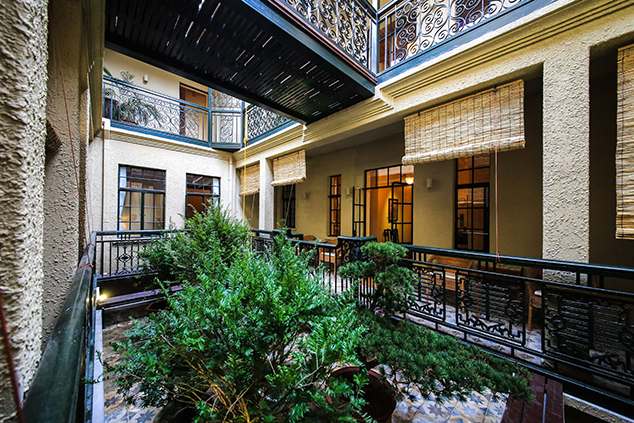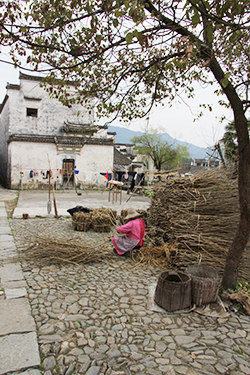Nestled in the foothills of Huangshan, Pingshan is a picture pretty village filled with classic Huizhou architecture – white-washed walls and dramatic eaves set around carved wooden pillars – that often gets overlooked in favour of the nearby Hongcun and
Xidi (it’s roughly equidistant between the two). But that means in place of bus loads of tourists, you get art students (especially when rapeseed flowers are in season during late March and early April) and relaxing locals populating the narrow alleyways and canal-side paths.
Sitting pretty toward the top of the large village is the extraordinary Imperial Guard Boutique Hotel. It stands on a site first given to warrior Shulian by Qing dynasty emperor Yongzheng for halting an assassination attempt; Shulian was also bestowed with the title of Imperial Guard. Yet the hall eventually fell into disrepair and more recently was being used as a roller skating rink until filmmaker and regular Zhang Yimou collaborator Zhang Zhenyan stepped in.
A restoration enthusiast, he decided to move the wooden structure of another ancestral home in nearby Pengxia to form the basis of his regeneration of Shulian’s Pingshan site, thus ‘saving both buildings’. It’s an incredible project, with an interior that combines the ancient carved timber with historical touches from around the region (including Former French Concession tiles and balconies) and nods to Zhang’s film career (a signed photo of Gong Li hangs on one wall for example).

So far, guests have included Fan Bingbing and Feng Xiaogang. If you’re fortunate enough to visit while Zhang is there (he’s currently busy with another restoration project in Qingpu), be sure to grab a few words with him; his stories are delivered in Mandarin with a typical filmmaker’s flourish.
The hotel’s elegant, comfortable rooms make for a great base to explore Pingshan's winding lanes and houses daubed with fading Maoist slogans. Other buildings in the village are being restored too, with some spectacular facades currently under renovation.

There's little to do in Pingshan in the evening (although the roller rink is still active a few doors down from the Imperial Guard Hotel), but on cold nights a fire is often lit in the Imperial Guard's coffee bar and lounge area and most guests retire early anyway, to afford them an early start to explore the surrounding villages. Hongcun and Xidi are a bike ride away, though if you can, get a car to nearby Guanlu (关麓村, pictured right), which is far less troubled by tourists. Here, a guide will take you in and around the fascinating local homes to admire the carvings and painted ceilings, many of which are in good condition despite history. Just bear in mind that the guides' English is limited.
How to get there There is one high speed gaotie train a day from Shanghai to Huangshan Bei and back (8.30am there, 2.30pm return). It costs from 304RMB one way and takes four and a half hours, but it whips you through some idyllic scenery, especially near Wuyuan. From Huangshan Bei, it’s an hour’s drive to Pingshan; ask the hotel about pick ups. The train times plus the drive mean that you're best off treating this as at least a three day break, or if you have longer tagging it on to a trip around Huangshan and the other villages nearby (see below for more on Xidi).
If you have your own car, all of the above becomes a lot easier, though we managed fine with public transport and a few lifts and taxis. Alternatively, you can make the one hour flight to Huangshan (from 620RMB on Ctrip) and arrange for a pick up from the airport.
Rooms at the Imperial Guard Boutique Hotel start from 699RMB through Qunar.com or booking.com
